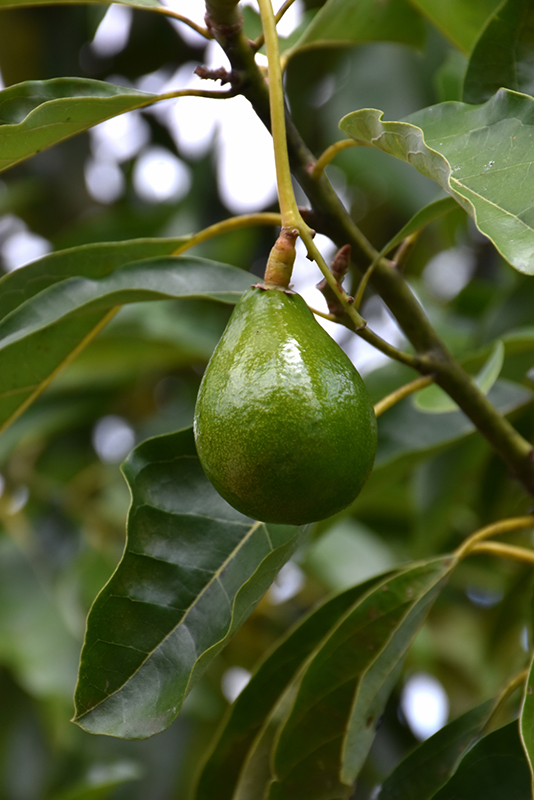Height: 15 feet
Spread: 10 feet
Sunlight:
![]()
![]()
Hardiness Zone: 8b
Description:
A semi-dwarf, cold hardy selection that ripens early in the season; features medium sized fruits with a rich, nutty flavor; great for eating fresh, added to salads, or blended into sauces or dips; creates a tropical look for home landscapes
Edible Qualities
Lila Avocado is a small tree that is typically grown for its edible qualities, although it does have ornamental merits as well. It produces dark green oblong fruit (technically 'drupes') with buttery yellow flesh which are typically harvested when mature. The fruit will often fade to black over time. Note that the fruits have hard inedible pits inside which must be removed before eating or processing. The fruits have a mild taste and a fleshy texture.
The fruit are most often used in the following ways:
- Fresh Eating
- Eating When Cooked/Prepared
- Sauces
Features & Attributes
Lila Avocado has attractive dark green evergreen foliage which emerges coppery-bronze in spring on a tree with an upright spreading habit of growth. The glossy oval compound leaves are highly ornamental and remain dark green throughout the winter. It features subtle clusters of fragrant white star-shaped flowers with chartreuse overtones at the ends of the branches from late winter to early spring. The fruits are showy dark green drupes which fade to black over time, which are displayed in mid summer. The fruit can be messy if allowed to drop on the lawn or walkways, and may require occasional clean-up. The rough brown bark adds an interesting dimension to the landscape.
This is an evergreen tree with an upright spreading habit of growth. Its average texture blends into the landscape, but can be balanced by one or two finer or coarser trees or shrubs for an effective composition. This is a high maintenance plant that will require regular care and upkeep, and should only be pruned after flowering to avoid removing any of the current season's flowers. It is a good choice for attracting bees, butterflies and squirrels to your yard. Gardeners should be aware of the following characteristic(s) that may warrant special consideration;
- Disease
Aside from its primary use as an edible, Lila Avocado is sutiable for the following landscape applications;
- Accent
- Hedges/Screening
- General Garden Use
- Orchard/Edible Landscaping
- Container Planting
Planting & Growing
Lila Avocado will grow to be about 15 feet tall at maturity, with a spread of 10 feet. It has a low canopy with a typical clearance of 2 feet from the ground, and is suitable for planting under power lines. It grows at a slow rate, and under ideal conditions can be expected to live for 80 years or more. While it is considered to be somewhat self-pollinating, it tends to set heavier quantities of fruit with a different variety of the same species growing nearby.
This tree is quite ornamental as well as edible, and is as much at home in a landscape or flower garden as it is in a designated edibles garden. It does best in full sun to partial shade. It does best in average to evenly moist conditions, but will not tolerate standing water. It may require supplemental watering during periods of drought or extended heat. This plant should not require much in the way of fertilizing once established, although it may appreciate a shot of general-purpose fertilizer from time to time early in the growing season. It is not particular as to soil pH, but grows best in sandy soils. It is somewhat tolerant of urban pollution. Consider applying a thick mulch around the root zone in winter to protect it in exposed locations or colder microclimates. This is a selected variety of a species not originally from North America.
Lila Avocado is a good choice for the edible garden, but it is also well-suited for use in outdoor pots and containers. Its large size and upright habit of growth lend it for use as a solitary accent, or in a composition surrounded by smaller plants around the base and those that spill over the edges. It is even sizeable enough that it can be grown alone in a suitable container. Note that when grown in a container, it may not perform exactly as indicated on the tag - this is to be expected. Also note that when growing plants in outdoor containers and baskets, they may require more frequent waterings than they would in the yard or garden.

